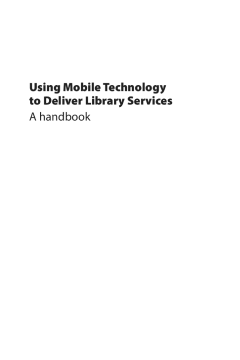
Additional Information
Book Details
Abstract
As mobile devices proliferate and the services and apps available increase exponentially, the average person expects information to be delivered to their mobile with minimum fuss and effort. Adapting to this new environment as an information service is crucial for survival but also offers myriad opportunities for improvement and promotion, providing a direct route to the user. Packed with easy to implement ideas, practical examples and international case studies, this title provides you with the ultimate toolkit, exploring ideas as simple as renewals and reminders to the more complex such as access to e-books and virtual worlds. Easy to follow coverage of the background and context to mobile delivery will enable you to fully understand the challenges and embrace the opportunities, getting to grips with critical issues such as what sort of services users really want. Key topics covered include: context including market penetration, range and functionality of devices, texting apps vs. mobile websites, mobile information literacy vs. other information literacies, mobiles in teaching, linking the physical and virtual worlds via mobile devices, E-books for mobiles, and the future of mobile delivery. This is an essential practical guide for all information professionals who want to get to grips with or improve their use of mobile services to strengthen their relationship with users. It would also be invaluable for museum staff facing the same challenges and LIS students and academics will find it a useful introduction to the topic.
Andrew Walsh is an Academic Librarian at Huddersfield University who has written, researched and presented widely on the application of mobile technologies within the library environment, information literacy, the use of active learning and using web 2.0 technologies. He won the UC&R Innovation Award in 2009.
"This book is a great starting point for anyone interested in using mobile technologies to deliver library services but not sure where to start. It's easy to read, the language used is jargon free, and the opportunities and challenges are fully explained. However it's not so simple that it wouldn't appeal to those who have a bit more knowledge and I can see myself consulting it regularly." - Refer
